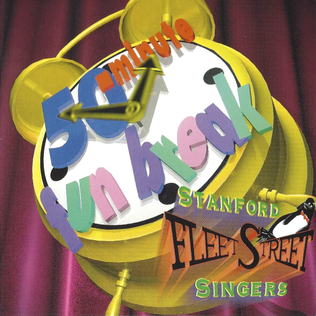
Collegiate a cappella ensembles are college-affiliated singing groups, primarily in the United States, and, increasingly, the United Kingdom and Ireland, that perform entirely without musical instruments. The groups are typically composed of, operated by, and directed by students. In the context of collegiate a cappella, the term a cappella typically also refers to the music genre performed by pop-centric student singing groups. Consequently, an ensemble that sings unaccompanied classical music may not be considered an a cappella group, even though technically it is performing a cappella.

Deke Sharon is an American singer, arranger, composer, director, producer, author, coach, pioneer, and teacher of a cappella music, and is one of the leaders and promoters of the contemporary a cappella community. He has been referred to as "the father of contemporary a cappella" by some authors, and "the godfather of a cappella" by others.
The Contemporary A Cappella Society, or CASA, is a 501(c)(3) charitable organization that fosters and promotes a cappella music of all styles around the world. CASA was founded in 1991 by Deke Sharon in San Francisco just after graduation. In his Tufts University dorm room during his senior year, Sharon published a newsletter, The "C.A.N.", mailed to all known collegiate a cappella groups by merging "The List", founded in 1988 and distributed by Rex Solomon, with the database maintained by his college a cappella group the Beelzebubs. The organization boasts over 6,000 current members, and serves as a resource for media and scholarly work in the area of contemporary a cappella.

BYU Vocal Point, or simply Vocal Point, is a seven to nine-member, male a cappella group at Brigham Young University (BYU). Founded by two students, Bob Ahlander & Dave Boyce, in 1991, Vocal Point is under the direction of former member Carson Trautman.

"The Longest Time" is a doo-wop song by Billy Joel, released in 1984 as the fourth single from the 1983 album An Innocent Man. Following the theme of the album in paying tribute to Joel's musical influences, the song is presented in the style of Frankie Lymon and the Teenagers. It reached number 14 on the Billboard Hot 100 and number 1 on Billboard's Adult Contemporary chart. In the United Kingdom the song reached number 25 on the UK Singles Chart.

The Tufts Beelzebubs, frequently referred to as "The Bubs", is a male a cappella group of students from Tufts University that performs a mix of pop, rock, R&B, and other types of music while spreading their motto of "Fun through Song". Founded in 1962, they have toured in Europe, Asia, South America, and North America, and they competed on NBC's The Sing-Off in December 2009, finishing in second place.
Straight No Chaser (SNC) is a professional American a cappella group that originated in 1996 at Indiana University. Originally a student group at Indiana University, they recorded a video in 1998 of a comical version of "The 12 Days of Christmas". The founding members all graduated, to be replaced by other students, in 1999. In 2007, the 1998 video went viral on YouTube, and subsequently led to a reunion of the founding members and a five-album record deal with Atlantic Records in 2008. The YouTube video has been viewed over 24 million times.
The Bear Necessities is an American TTBB acappella group from Brown University. Also known as "The Bears", they were established in 1992, making them the youngest of the two TTBB acappella groups at Brown. The Bears have released 8 albums, and are currently in the process of recording an EP to be released in late 2024. They are best known for wearing suspenders and former member Masi Oka, one of the best known alumnus of a college a cappella group and actor in the television series Heroes. The group performs at Brown, across the country and internationally. Their repertoire ranges from R&B to jazz to classic rock to pop to Disney songs. Founded as an alternative a cappella ensemble, the group has a tradition of highly theatrical, interactive performance and is acclaimed for creating a fun, down-to-earth atmosphere in both rehearsal and concert. This is evident in the final track of each of their albums, titled “Bear-a-oke,” a karaoke version of one of the album’s songs designed to invite the listener to sing along. The group’s alumni song is Streets of Philadelphia by Bruce Springsteen, arranged by member Andrew Callard in 1995.

Not Too Sharp is an all-male a cappella group from the University of New Hampshire in Durham, New Hampshire, USA. Begun in 2002, the 9-12 man group performs live on the college campus, at other groups’ venues, and in the New Hampshire community. Their annual benefit show supports the American Cancer Society. The ensemble has previously competed twice in the International Championship of Collegiate A Cappella in 2015 and 2018. The Recorded Acappella Review Board says of Not Too Sharp, “All male, slightly goofy and possessed of an infectious energy… Charisma just drips out of the speakers.” In 2010, the group was presented with a "Best of New Hampshire" award for contemporary a cappella.

The House Jacks is a professional a cappella quintet from San Francisco, founded in 1991 by Deke Sharon.

Peter James Hollens is an American singer-songwriter, producer and entrepreneur. He has been involved with a cappella music since 1999 when he and Leo da Silva founded the University of Oregon's a cappella group, On The Rocks, known as the first official collegiate a cappella group in Oregon. He regularly releases new music videos to his YouTube channel. With over 9+ million followers and over 3 million subscribers, his content has received over a billion total views since 2011.

Dhamakapella is a coed South Asian fusion a cappella group based in Case Western Reserve University, Cleveland, Ohio. Formed in the spring of 2005 by students Mayank Prasad, Raksha Soora, and Manoj Nair, Dhamakapella's music has been influenced from both Eastern and Western elements, and mixes contemporary Western songs with popular Eastern music. Since Dhamaka's inception in 2005, the group has recorded and produced albums, EPs, and singles composed entirely of original arrangements written by current members of the group or alumni. As CWRU's largest competitive a cappella group, the group competes nationally and has won twenty-eight national titles.

The Stanford Fleet Street Singers is a comedy a cappella group from Stanford University. The group performs original songs and sketch comedy, and wears a uniform of black vests and red bow ties. Fleet Street is perhaps best known for having published the first collegiate a cappella album composed entirely of original music. In total, Fleet Street has released 13 studio albums and has received a dozen national awards.

Cadence was a Canadian a cappella vocal group based in Toronto, Ontario. Nominated for the 2006 Juno Award for Best Vocal Jazz Album of the Year for their album "Twenty for One", they have produced five albums.
DCappella was an a cappella group formed via a national search and run by Disney Music Group featuring Disney songs. The group originally consisted of Antonio Fernandez, Joe Santoni, Morgan Keene, Orlando Dixon, RJ Woessner, Shelley Regner, and Sojourner Brown: Kalen Kelly and Kelly Denice Taylor joined the group after Regner and Brown left. Deke Sharon was DCappella’s co-creator, music director, arranger and producer.
Bill Hare is an American Grammy Award-winning audio engineer known for pioneering contemporary recording techniques in a cappella. He was the first to record voices individually, and the first to mic singers exactly as one would mic instruments. Over the course of his career, Hare has become well known for his outsize role in shaping the sound of recorded a cappella. Industry observers have called him the "patriarch" and "the Dr. Dre" of a cappella recording. Deke Sharon, founder and longtime president of the Contemporary A Cappella Society, wrote of Hare's influence in 2018: "The sound of contemporary recorded a cappella owes more to his technique, style, and pioneering than any other person."

50-Minute Fun Break, released in 1992, is the fourth studio album by the collegiate comedy a cappella group the Stanford Fleet Street Singers. It was a landmark album in the a cappella genre for its pioneering recording techniques and use of studio effects. The album won critical acclaim for its studio work, including a special award in engineering from the Contemporary A Cappella Recording Awards, although some critics criticized the studio engineering as "intrusive." 50-Minute Fun Break marked a breakout album for its audio engineer, Bill Hare, who went on to become the most-awarded engineer in a cappella.
Stanford Counterpoint is an all-femme a cappella group from Stanford University. It is the second-oldest a cappella group from Stanford.













